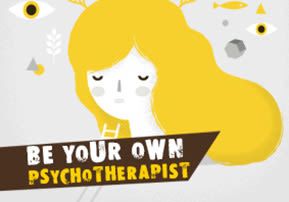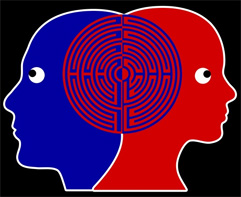
Be Your Own Psychotherapist
The main challenge of self-therapy is one’s willingness to expose oneself to all kinds of painful uncertainties and to battle the forces that oppose growth...

Ideally a psychotherapist should play the part of a guide on a strenuous mountain tour, showing the traveler which paths will be rewarding to take and which paths to avoid at all cost. The truth is that psychotherapists are guides who are not always very certain of the way themselves; this is because although they may be experienced in mountain climbing they have not yet climbed this particular mountain before.
Is it possible that a person can observe himself better than a professional therapist can? After all, he lives with himself night and day while the professional therapist is an outsider who may only see him for an hour a week. Is it really possible for a person to be his own psychotherapist? Wouldn’t he need an extensive knowledge base and years of training and experience in order to help himself?
First of all, in order to work with others, clearly a psychotherapist must have an extensive psychological knowledge about the nature of the unconscious forces that effect people as well as how to unearth these  unconscious forces. A psychotherapist, while not necessarily a Rabbi, also needs a solid Torah knowledge base regarding the nature of the soul and what will enable a particular person to find the openings in the darkness of their lives through which they can move into the light.
unconscious forces. A psychotherapist, while not necessarily a Rabbi, also needs a solid Torah knowledge base regarding the nature of the soul and what will enable a particular person to find the openings in the darkness of their lives through which they can move into the light.
It takes years of training and experience to develop the skills to know with some certainty which issues in the maze of issues presented by a person should be tackled first and which issues should be left out for the time being. The religious therapist has acquired a highly developed ability to “feel into” what is bubbling up in the souls of other people; his sensitivity to their spiritual and psychic undercurrents is almost a sixth sense.
Finally, the most important knowledge base that a psychotherapist needs is knowledge about himself. In working with others, the therapist needs to enter into another person’s strange world, with its own peculiarities and its own laws without losing himself to it. A therapist without self-knowledge will certainly misconstrue, mislead, and cause injury to another through carelessness, ignorance, or conceit. Not only must a therapist have a thorough familiarity with his tools, and skill in using them, but he must be straightened out in his relationship to himself, in his relationship to others and in his relationship to G-d. Since all of these requirements are indispensable, anyone who does not fulfill them should not be assuming the responsibility involved in doing psychotherapy with others.
Bottom of Form
In self-analysis, less psychological knowledge is demanded than in the analysis of others, and one does not need any of the strategies that are necessary in dealing with other people. The main challenge to self-therapy is in the emotional factors that blind us to our own unconscious forces. We can know that the main challenge to self-therapy is emotional and not intellectual because when analysts analyze themselves they don’t seem to have such a great advantage over layman.
The main emotional challenge of self-therapy is one’s willingness to expose oneself to all kinds of painful uncertainties and hurts and to do battle with the forces that oppose our growth. The ultimate driving force is the person’s unrelenting will to come to grips with himself, and his commitment to grow and to leave nothing untouched that prevents his growth. The capacity for self-honesty, even if it is initially not very strong, will gradually increase if he works on himself with some degree of regularity. Each obstacle that he surmounts gives him the momentum to approach the next obstacle with greater inner strength.
Bottom of Form
The upshot of all this is the banal truth that if you want to analyze yourself you must not just study what is most obvious about yourself. You must take every opportunity to become familiar with this stranger that is yourself. I’m not just speaking figuratively – most people know very little about themselves, and only gradually, by following this process, do they learn to what extent they have lived in ignorance. In the words of my analyst’s analyst’s analyst, Dr. Karen Horney, M.D.: “If you want to know New York you do not merely look at it from the Empire State Building. You go to the lower East Side; you stroll through Central Park; you take a boat around Manhattan; you ride on a Fifth Avenue bus; and a great deal more. Opportunities to become familiar with yourself will present themselves, and you will see them, provided you really want to know this queer person who lives your life.”
People with mild neurotic trends can certainly benefit from self-therapy by following the method that I have outlined previously. (See: Effective Soul Healing; How to Get Unstuck) It might be helpful for people who are mildly challenged to see an expert initially to become acquainted with the basic method. After that, these people can do very well on their own. They will be able to follow my three-step process of journaling their spontaneous self-expression, spontaneous self-understanding and personal prayer (see: How to get unstuck).
A mildly neurotic person will also benefit from occasional contact with a professional if he reaches a difficult impasse. Yet if someone in the clutches of a severe neurosis were advised to only come for therapy when he really wanted to, he would probably play hooky as soon as the first major stumbling block occured. It’s not that people with severe forms of neurosis cannot analyze themselves, they certainly can and should do so in between appointments, but they will need to maintain regular contact with a professional in order to have a chance of making any real progress.











Tell us what you think!
Thank you for your comment!
It will be published after approval by the Editor.